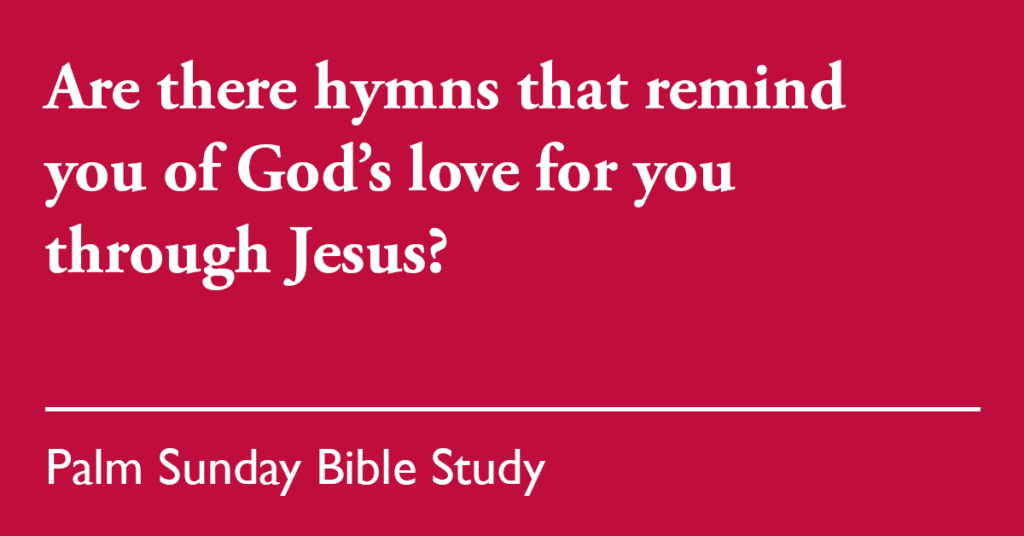This page is available in: Español
Bible Study: Palm Sunday (C) – 2022
April 10, 2022
RCL: Isaiah 50:4-9a; Psalm 31:9-16; Philippians 2:5-11; Luke 22:14-23:56

Isaiah 50:4-9a
This section of Isaiah is the third of a four-part series in Isaiah which talks about the suffering servant. Many Christians have interpreted this to be Jesus. In this third servant song, as it is called, the servant is talking about how he is willing to suffer because he knows that he has listened to God and that God sustains him. The first two verses are the most interesting for me because they talk both about teaching and learning. This author is saying that to teach, you must have the ear of a student. It is the humility of recognizing that you continue to need to learn which gives you the ability to teach. And as you learn to listen closely to God, God sustains you through these teachings.
- In what areas of your life do you need to learn how to listen as one who is taught?
- When and how have you experienced God’s sustenance? What teachings helped you to recognize it?
Psalm 31:9-16
The psalms are great because they show a range of human emotions and reactions to a God who we sometimes don’t understand. In this snippet from Psalm 31, we hear the lament of someone suffering great distress. Although the phrase, “My strength fails me because of affliction, and my bones are consumed,” could be metaphorical, it also could be literal. This could be someone who is so ill that he does not know how he can continue. Now that we have had over two years of a pandemic ravaging the health of the world, this psalm seems like it could be speaking not only of our own physical suffering but also could be speaking to the exhaustion of collective suffering and grief. Yet this lament is not the end. By the end of today’s verses, the Psalmist remembers his own past faith and hope that God would continue to be present in his life, saving him from his pain and suffering.
- What is your biggest grief? Name it. Share it with God. Tell God just how much you are hurting.
- When have you had “Aha!” moments of faith? Remind yourself of those moments.
Philippians 2:5-11
This passage is sometimes called the “Christ Hymn”. Some people believe that Paul was quoting a well-known hymn of the early followers of Jesus. He was reminding them of what they already had been taught about Jesus through this hymn. Like all the passages today, this piece focuses on the suffering that comes with being human. God did not have to send Jesus to become human and take on the very real human suffering of being tortured and dying but did because that is how God shows the expansiveness of the love that God has for creation. All of creation is bowing down and calling out because of this love. It is a very powerful picture, even while it reminds us that this love comes at the cost of suffering.
- Are there hymns that remind you of God’s love for you through Jesus?
- Where in creation can you hear and see God’s love?
Luke 22:14-23:56
In this year’s lectionary, we do not have the triumphal entry into Jerusalem on the back of a donkey. There is no waving of branches and declaring him the Messiah. Instead, this passage focuses on his torture and death. In the longer version, we do have the institution of the Lord’s Supper. Often the trial (Luke 23:1-25) is read aloud with members of the congregation crying in unison, “Crucify, crucify him!” (v. 21). It is by joining our voices together that we are recognizing our sinfulness and our complicity in sins, even when we did not commit them ourselves. Jesus, even as he is dying, is offering forgiveness. He says, “Forgive them; for they do not know what they are doing” (Luke 23:34). Who is Jesus forgiving? Although the immediate context references the people beating him and stealing his clothes, might there be others in that story who need forgiveness? Does Peter need to be forgiven for denying him? Do the people crucified with him need to be forgiven? Is this a blanket statement of forgiveness? This passage from Luke, especially if it is read aloud by the members of the church, reminds us that we take part in the act of crucifying Jesus. This Palm Sunday is one of recognizing the depths of our own sinfulness and our need for the forgiveness and grace Jesus offers us, even when we do not know we need it.
- For what do we seek forgiveness?
This page is available in: Español
Don’t forget to subscribe to the Sermons That Work podcast to hear this sermon and more on your favorite podcasting app! Recordings are released the Thursday before each liturgical date.
Receive Free Weekly Sermons That Work Resources!
This page is available in: Español


